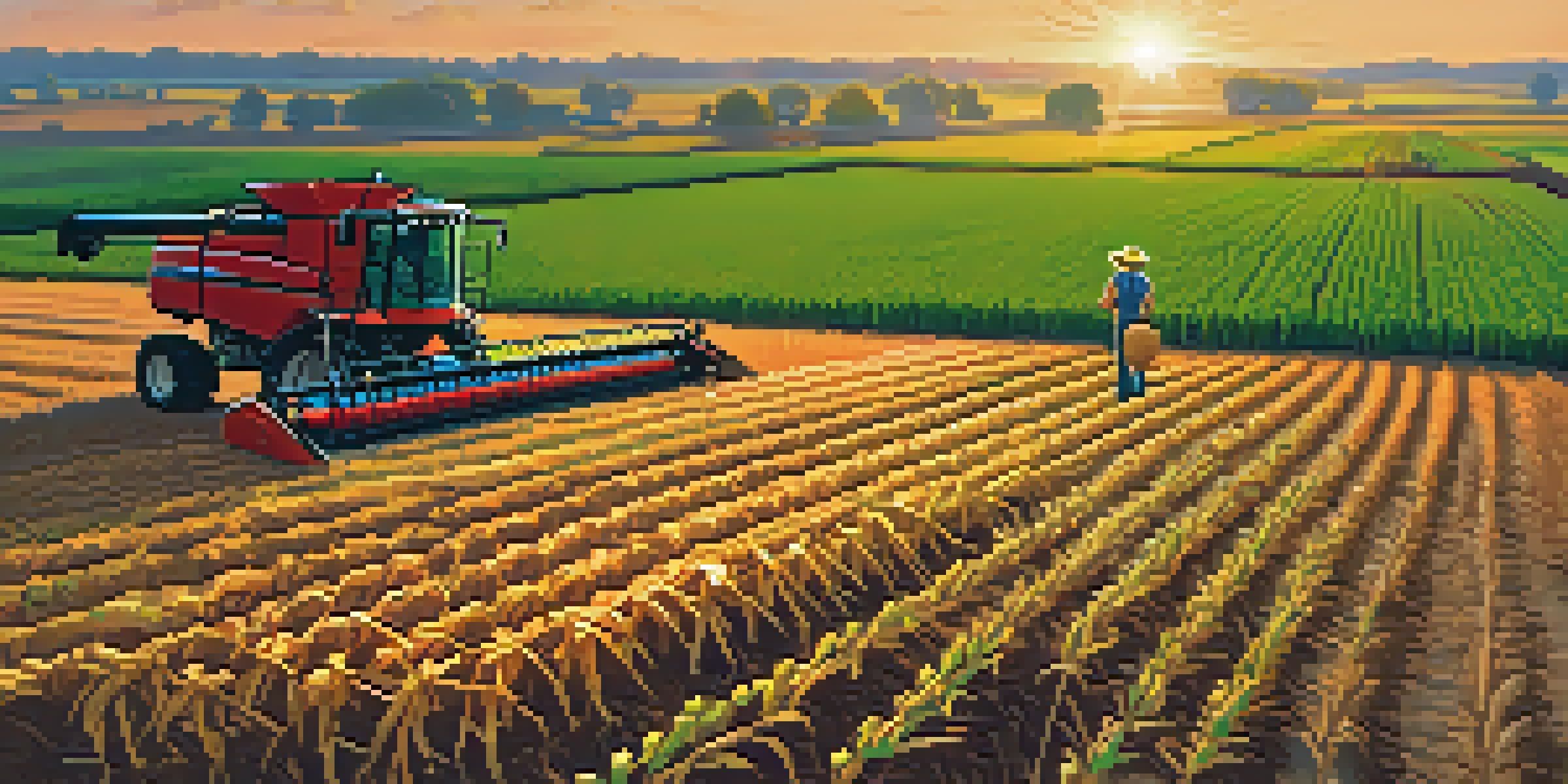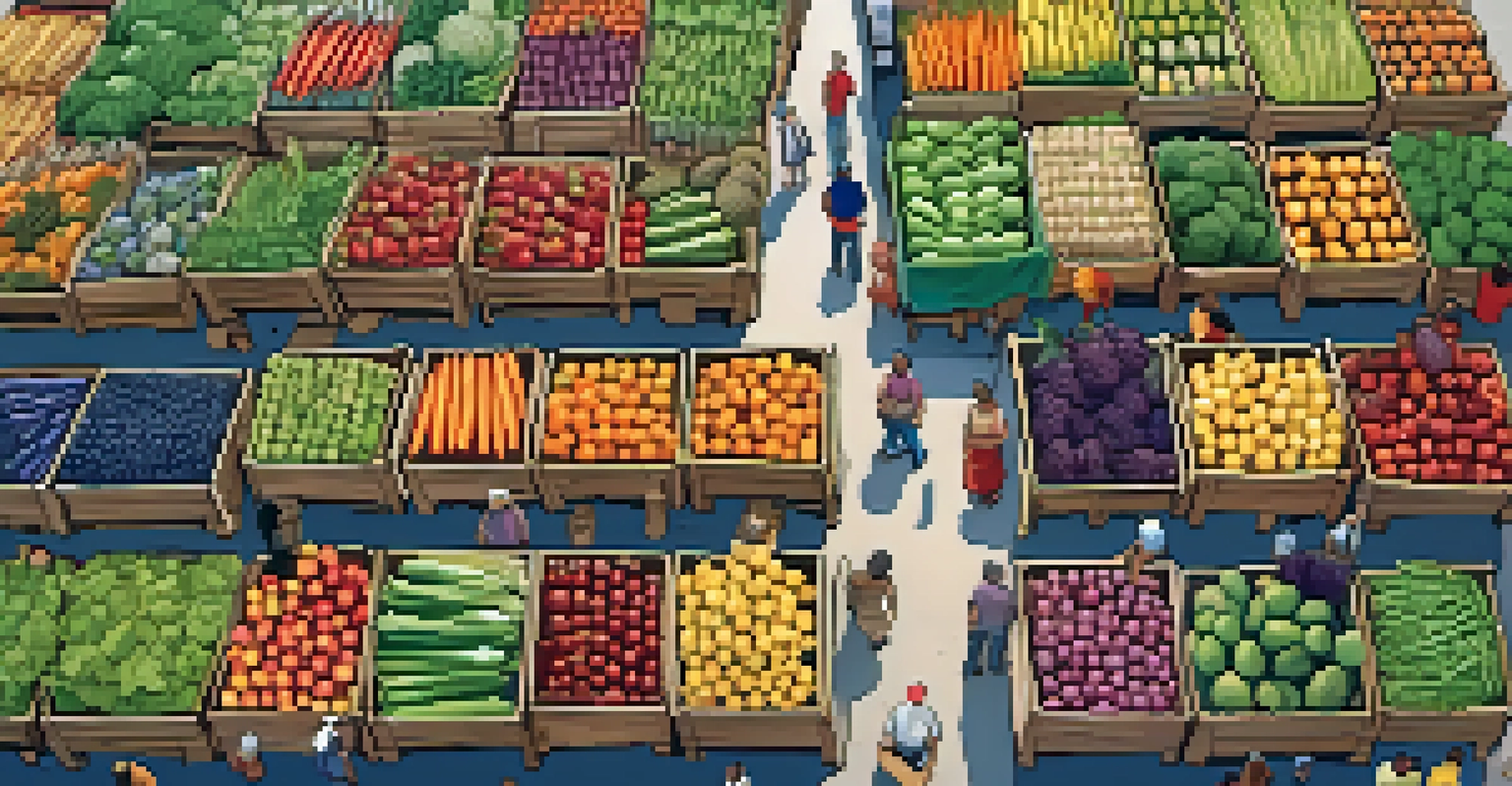Agricultural Challenges: Missouri's Climate Variability

Understanding Missouri's Climate Patterns
Missouri's climate is characterized by hot summers and cold winters, but its variability is what truly impacts agriculture. The state experiences a mix of weather patterns, including droughts, floods, and severe storms, making it a unique challenge for farmers. Understanding these fluctuations is crucial for developing effective agricultural practices.
The farmer is the one who is the caretaker of the land. He must be aware of the effects of climate change and adapt accordingly.
For instance, the average rainfall can vary significantly from year to year, leading to either drought conditions or excessive moisture. This unpredictability can affect crop yields, forcing farmers to adapt their strategies regularly. As climate change progresses, these patterns are expected to become even less predictable, adding another layer of complexity.
Farmers in Missouri must stay informed about these climate trends to make educated decisions about planting, irrigation, and harvesting. By recognizing and understanding these patterns, they can better prepare for potential disruptions and optimize their operations.
Impact of Drought on Crop Production
Drought is one of the most pressing challenges faced by Missouri's farmers, significantly impacting crop production. During periods of low rainfall, crops like corn and soybeans struggle to thrive, leading to reduced yields and financial loss. This not only affects the farmers but also the broader agricultural economy that relies on these staples.

To combat drought, many farmers are turning to innovative irrigation techniques and drought-resistant crop varieties. These methods can help mitigate the effects of water scarcity, but they require investment and knowledge, which may not be readily available to all. Moreover, the implementation of these strategies can vary greatly depending on the specific region within Missouri.
Missouri's Climate Challenges Impact Farming
Farmers face the dual threats of drought and flooding, requiring them to adapt their agricultural practices to manage unpredictable weather patterns.
As climate variability continues to increase, the importance of drought preparedness becomes even more critical for farmers. This might mean diversifying crops or investing in soil health to retain moisture more effectively, ensuring that they can withstand future dry spells.
Flooding and Its Consequences for Agriculture
On the flip side, flooding poses a significant threat to Missouri's agriculture as well. Heavy rainfall can lead to swollen rivers and inundated fields, which can devastate crops and erode valuable topsoil. The aftermath of flooding can leave farmers with damaged infrastructure and a long road to recovery.
In the face of climate change, every farmer must embrace innovation and community to thrive.
In some cases, crops may not only be destroyed but also contaminated, making them unfit for consumption. This loss can ripple through the economy, impacting local markets and consumers. Understanding flood risks is essential for farmers to create contingency plans that can help minimize the impact.
Farmers are increasingly utilizing flood management strategies, such as constructing levees and improving drainage systems. By proactively addressing flood risks, they can protect their investments and ensure a more resilient farming operation, despite the unpredictable nature of Missouri's weather.
The Role of Technology in Adapting to Climate Change
Technology plays a pivotal role in helping Missouri farmers adapt to climate variability. Precision agriculture, which uses data analytics and GPS technology, allows farmers to monitor crop health and soil conditions more effectively. This information can lead to more informed decisions about resource allocation, ultimately boosting productivity even in challenging climates.
Additionally, advancements in weather forecasting technology provide farmers with timely updates about impending weather events. This allows them to take precautionary measures, such as adjusting planting schedules or implementing protective strategies. By harnessing technology, farmers can enhance their ability to respond to climate-related challenges.
Soil Health Is Key to Resilience
Healthy soil plays a crucial role in helping farmers withstand climate variability by retaining moisture during droughts and draining excess water during floods.
Moreover, the integration of sustainable practices, such as cover cropping and no-till farming, is becoming more common. These methods not only improve soil health but also help mitigate the effects of extreme weather, ensuring that farms remain productive in an ever-changing environment.
Soil Health: A Foundation for Resilience
Soil health is a foundational aspect of agricultural resilience, especially in the face of climate variability. Healthy soil can retain moisture during drought and drain excess water during floods, making it an essential resource for farmers. Practices that enhance soil health, such as crop rotation and organic amendments, are gaining popularity among Missouri farmers.
Investing in soil health not only benefits individual farms but also contributes to the overall sustainability of the agricultural sector. Healthy soil can sequester carbon, improve biodiversity, and enhance water quality, creating a more balanced ecosystem. This long-term perspective is crucial for addressing the challenges posed by climate change.
Farmers are increasingly recognizing the importance of soil health management and are seeking education and resources to implement these practices. By prioritizing soil health, they can build a resilient foundation that supports their operations, regardless of the weather challenges they face.
Policy and Support for Farmers Facing Climate Challenges
Government policies and support systems play a vital role in helping Missouri farmers navigate climate challenges. Programs that provide financial assistance, technical resources, and education can empower farmers to adopt sustainable practices and invest in adaptive technologies. These initiatives are crucial for building a resilient agricultural sector.
Collaboration between local, state, and federal agencies can lead to more effective responses to climate variability. By fostering partnerships with agricultural experts and community organizations, farmers can access the knowledge and resources they need to thrive. This collective approach strengthens the agricultural community and ensures that farmers have the tools to adapt.
Community Support Enhances Adaptation
Local organizations and cooperatives foster collaboration among farmers, enabling them to share resources and knowledge to better navigate climate challenges.
Furthermore, advocacy for policies that address climate change on a broader scale is essential for the long-term health of agriculture. By pushing for sustainable practices and funding for research, farmers can contribute to a collective effort that benefits both their livelihoods and the environment.
Community Efforts Towards Sustainable Agriculture
Community efforts are increasingly vital in addressing the agricultural challenges posed by Missouri's variable climate. Local organizations and cooperatives are coming together to share resources, knowledge, and best practices among farmers. This collaborative spirit helps farmers adapt to changing conditions more effectively and fosters a sense of solidarity.
Workshops, field days, and community forums provide platforms for farmers to learn from one another and explore innovative solutions. These gatherings not only enhance individual farming practices but also strengthen the agricultural community as a whole. By sharing experiences and strategies, farmers can better navigate the complexities of climate variability.

Moreover, community-supported agriculture (CSA) programs encourage consumers to support local farms, creating a more resilient food system. By prioritizing local produce, consumers contribute to the economic stability of their communities, which in turn helps farmers thrive. This interconnectedness highlights the importance of community in addressing agricultural challenges.